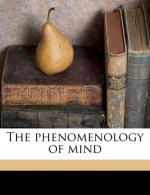
|
| Name: _________________________ | Period: ___________________ |
This test consists of 5 multiple choice questions, 5 short answer questions, and 10 short essay questions.
Multiple Choice Questions
1. Whose work did Hegel write in the shadow of?
(a) Leibniz.
(b) Kant.
(c) Spinoza.
(d) Hume.
2. What does Hegel say self-consciousness can express as Absolute Spirit?
(a) The perfection of man's will.
(b) The divine nature of fate.
(c) The inevitable nature of self-consciousness.
(d) The inner divinity of man.
3. According the Hegel's philosophy, what is the one state where complete annihilation of difference occurs?
(a) Death.
(b) Self-awareness.
(c) Transcendentalism.
(d) Loss.
4. When does the complete spiritual being begin to function in the world according to Hegel?
(a) When the soul begins its work within the self.
(b) When the philosopher discovers the Absolute.
(c) When the soul completes its work in society.
(d) When the Absolute is established as a modus operandi.
5. What does Hegel contrast darkness to?
(a) Creativity.
(b) Reason.
(c) Consciousness.
(d) Vision.
Short Answer Questions
1. What does the conscience create according to Hegel?
2. How does Hegel define Enlightenment?
3. How is belief transformed into enlightenment according to Hegel?
4. What is freedom at the level of absolute freedom and terror caused by according to Hegel?
5. How does Hegel describe the moral consciousness?
Short Essay Questions
1. What, in Hegel's view, is the purpose of life?
2. What is the contradiction that governs the self's relationship with morality, in Hegel's view?
3. Define the German word Geist.
4. In what way does Hegel say that humans can continue to progress beyond Absolute Knowledge?
5. According to Hegel, what do artists and tool makers have in common?
6. What is the difference between "property" and "no property" in Hegel's view?
7. How does Hegel define duty?
8. How does Hegel define Absolute Freedom?
9. In Hegel's philosophy, what is the difference between conscience and the moral self-consciousness?
10. What is the effect of Insight on self-consciousness, in Hegel's philosophy?
|
This section contains 847 words (approx. 3 pages at 300 words per page) |

|




